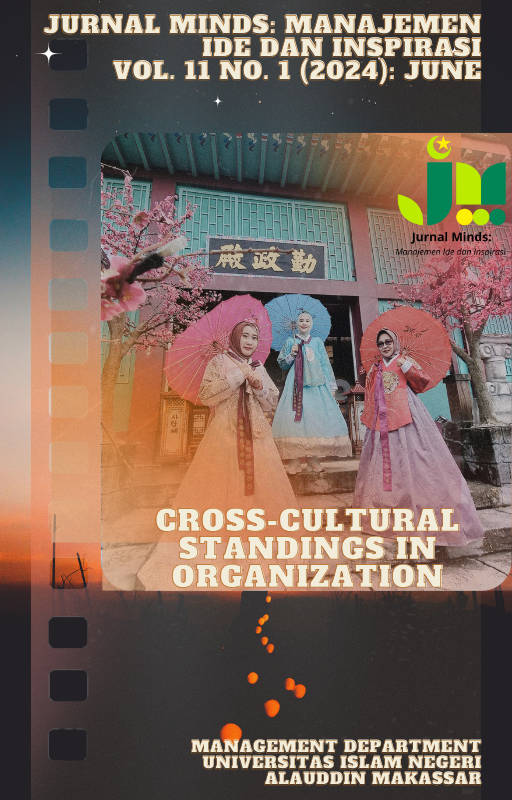Date Log
Copyright (c) 2024 Adella Nurfadilah (Author)

This work is licensed under a Creative Commons Attribution 4.0 International License.
The Capability to 'Have It All': Exploring how Socioeconomic Conditions Affect Married Women Direct Sellers' Lives
Corresponding Author(s) : Adella Nurfadilah
Jurnal Minds: Manajemen Ide dan Inspirasi,
Vol. 11 No. 1 (2024): June
Abstract
The 'have it all' ideology has proven challenging; thus, many married women turn to direct selling. While offering easiness, recent studies highlight its potential exploitation, particularly among low-income individuals. This study addresses the scarcity of qualitative research on married women in Indonesia's beauty industry who engage in direct selling, examining how socioeconomic conditions impact their lives. Through snowball sampling and in-depth interviews among 16 married women direct sellers, the findings indicated that socioeconomic status enhances their ability to balance multiple roles. However, success is not assured, regardless of initial conditions. These findings are pivotal for policymakers and practitioners seeking to establish a fairer, more empowering environment for women.
Keywords
Download Citation
Endnote/Zotero/Mendeley (RIS)BibTeX
References
Archibald, M. M. (2015). Investigator triangulation. Journal of Mixed Methods Research, 228–250. https://doi.org/https://doi.org/10.1177/1558689815570092
Biggart, N. (1989). Charismatic capitalism: Direct selling organizations in America. The University of Chicago Press.
Blair-Loy, M. (2003). Competing Devotions: Career and Family among Women Executives. Harvard University Press.
Collamer, N. (2013). Can you really make money in direct sales? Forbes. https://www.forbes.com/sites/nextavenue/2013/04/01/can-you-really-make-money-in-direct-sales/?sh=9ba0fe169c71
Crittenden, V. L., & Bliton, K. H. (2019). Direct selling: The power of women helping women. Go-to-Market Strategies for Women Entrepreneurs: Creating and Exploring Success, 2014, 195–205. https://doi.org/10.1108/978-1-78973-289-420191024
Crittenden, V. L., Crittenden, W. F., & Ajjan, H. (2018). Direct Selling in South Africa : Empowering Women Entrepreneurs. Hollywood, CA: US Association for Small Business and Entrepreneurship.
D’Antonio, V. (2019). From Tupperware to Scentsy: The gendered culture of women and direct sales. Sociology Compass, 13(5), 1–11. https://doi.org/10.1111/soc4.12692
de Casanova, E. M. (2011). Multiplying themselves: Women cosmetics sellers in ecuador. Feminist Economics, 17(2), 1–29. https://doi.org/10.1080/13545701.2011.568419
Denzin, N. K. (2012). Triangulation 2.0. Journal of Mixed Methods Research, 80–88. https://doi.org/https://doi.org/10.1177/1558689812437186
Direct Selling Association. (n.d.). What is Direct Selling? Retrieved July 1, 2023, from https://www.dsa.org/about/direct-selling
Direct Selling Association. (2017). The value of direct selling to Hispanic Americans. https://www.dsa.org/docs/default-source/direct-selling-facts/the-value-of-direct-selling-to-hispanic-americans_2.pdf?sfvrsn=2
Direct Selling Association. (2020). 2020 Consumer Attitudes & Entrepreneurship Study. https://www.dsa.org/docs/default-source/research/dsa-ipsos-2020-consumerattitudesinfographic2-27.pdf?sfvrsn=68ddfa5_2%27
Gleim, M. R., Johnson, C. M., & Lawson, S. J. (2019). Sharers and sellers: A multi-group examination of gig economy workers’ perceptions. Journal of Business Research, 98(January), 142–152. https://doi.org/10.1016/j.jbusres.2019.01.041
Guendouzi, J. (2006). ‘“The Guilt Thing”’: Balancing Domestic and Professional Roles. 901–909. https://doi.org/https://doi.org/10.1111/j.1741-3737.2006.00303.x
Guest, G., Bunce, A., & Johnson, L. (2006). How Many Interviews Are Enough?: An Experiment with Data Saturation and Variability. Field Methods, 59–82. https://doi.org/https://doi.org/10.1177/1525822x05279903
Gupta, S. (2022). Managing brand preferences of resellers. Industrial Marketing Management, 103(November 2020), 130–145. https://doi.org/10.1016/j.indmarman.2022.01.019
Hays, P. A. (1996a). Addressing the complexities of culture and gender in counseling. Journal of Counseling and Development, 74(4), 332–338. https://doi.org/https://doi.org/10.1002/j.1556-6676.1996.tb01876.x
Hays, P. A. (1996b). Addressing the complexities of culture and gender in counseling. Journal of Counseling and Development, 74(4), 332–338. https://doi.org/10.1002/j.1556-6676.1996.tb01876.x
Intan, T., & Abdullah, N. a. H. (2021). Beauty Myths and Consumer Culture in Indonesian Chick-lit Novel. Eralingua: Jurnal Pendidikan Bahasa Asing Dan Sastra, 284–298. https://doi.org/https://doi.org/10.26858/eralingua.v5i2.19269
Kemenperin. (2020). Perubahan Gaya Hidup Dorong Industri Kosmetik. https://kemenperin.go.id/artikel/21460/Perubahan-Gaya-Hidup-Dorong-Industri-Kosmetik
Khoiriyah, A. M. (2020). Perlindungan Dan Hak Pekerja Perempuan Di Bidang Ketenagakerjaan. IJouGS: Indonesian Journal of Gender Studies, 1(1). https://doi.org/10.21154/ijougs.v1i1.2067
Khusainova, R., de Jong, A., Lee, N., Marshall, G. W., & Rudd, J. M. (2018). (Re) defining salesperson motivation: current status, main challenges, and research directions. Journal of Personal Selling and Sales Management, 38(1), 2–29. https://doi.org/10.1080/08853134.2017.1415761
Malhotra, N. K. (2010). Marketing Research: An Applied Orientation (6th Edition). Prentice Hall.
Mccaughey, M., & French, C. (2001). Women’s sex toy parties: Technology, orgasm, and commodification. Sexuality and Culture, 77–96. https://doi.org/https://doi.org/10.1007/s12119‐001‐1031‐2
Mullaney, J., & Shope, J. (2012). Paid to party: Working time and emotion in direct home sales. Rutgers University Press.
Parini, A. (2018). The truth about selling from home. Parents. https://www.parents.com/parent-ing/work/direct‐sales‐the‐truth‐about‐selling‐from‐home/
Pearce, J. (2023). Achieving motherhood: A qualitative analysis of MLM success stories online. Feminist Media Studies, 00(00), 1–17. https://doi.org/10.1080/14680777.2023.2172056
Peterson, R. A., Crittenden, V. L., & Albaum, G. (2019). On the economic and social benefits of direct selling. Business Horizons, 62(3), 373–382. https://doi.org/10.1016/j.bushor.2018.12.002
Rees, M. E. (2021). Selling the Ability to “Have It All”: How Direct Selling Organizations Exploit Intensive Mothering Ideologies. Social Problems, 70(2), 474–490. https://doi.org/10.1093/socpro/spab042
Schaner, S., & Das, S. (2016). Female Labor Force Participation in Asia: Indonesia Country Study. SSRN Electronic Journal, 474. https://doi.org/10.2139/ssrn.2737842
ŚCieszko, E. , Budny, E., Rotsztejn, H., & Erkiert‐Polguj, A. (2021). How has the pandemic lockdown changed our daily facial skincare habits? Journal of Cosmetic Dermatology, 3722–3726. https://doi.org/https://doi.org/10.1111/jocd.14059
Seidel, S., & Urquhart, C. (2013). On emergence and forcing in information systems grounded theory studies: The case of strauss and corbin. Journal of Information Technology, 1, 157–209. https://doi.org/10.1007/978-3-319-29266-3_8
Slaughter, A. (2012). Why Women Still Can’t Have It All. The Atlantic. https://www.theatlantic.com/magazine/archive/2012/07/why-women-still-cant-have-it-all/309020/
Statista. (2022). Size of the global direct selling community 2013-2021, by region. https://www.statista.com/statistics/293178/size-of-the-global-direct-selling-community-by-region/
Utaminingsih, A. (2017). Gender dan Wanita Karir. Universitas Brawijaya Press.
Waight, E. (2019). Mother, consumer, trader: Gendering the commodification of second-hand economies since the recession. Journal of Consumer Culture, 19(4), 532–550. https://doi.org/10.1177/1469540519872069
Williams, S., & Bemiller, M. (2011). Women at Work: Tupperware, Passion Parties, and Beyond. Boulder, CO: Lynne Rienner Publishers.
World Federation Statistical Database (2018-2021). (2022). https://wfdsa.org/wp-content/uploads/2022/07/WFDSA-Statistical-Database-2018-2021-.xlsx
Wrenn, M. V. (2022). Overworked, Alienated, and Externalized: Multi-Level Marketing Distributors in the Neoliberal Age. Journal of Economic Issues, 648–654. https://doi.org/https://doi.org/10.1080/00213624.2022.2066449
Wrenn, M. V., & Waller, W. (2021). Boss Babes and Predatory Optimism: Neoliberalism, Multi-level Marketing Schemes, and Gender. Journal of Economic Issues, 55(2), 423–431. https://doi.org/10.1080/00213624.2021.1908805
